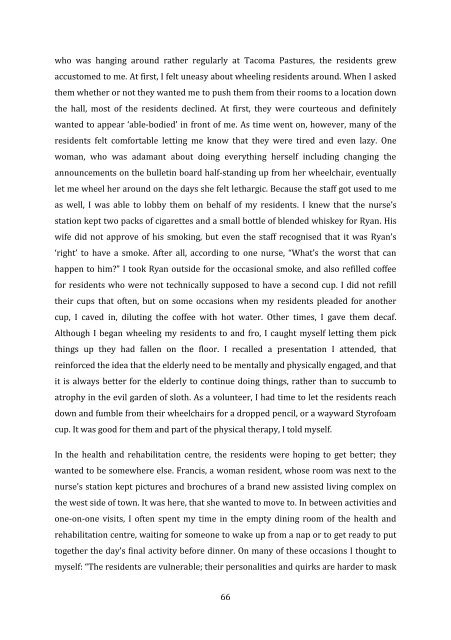Philip Y. Kao PhD thesis - Research@StAndrews:FullText
Philip Y. Kao PhD thesis - Research@StAndrews:FullText
Philip Y. Kao PhD thesis - Research@StAndrews:FullText
You also want an ePaper? Increase the reach of your titles
YUMPU automatically turns print PDFs into web optimized ePapers that Google loves.
who was hanging around rather regularly at Tacoma Pastures, the residents grew<br />
accustomed to me. At first, I felt uneasy about wheeling residents around. When I asked<br />
them whether or not they wanted me to push them from their rooms to a location down<br />
the hall, most of the residents declined. At first, they were courteous and definitely<br />
wanted to appear ‘able-bodied’ in front of me. As time went on, however, many of the<br />
residents felt comfortable letting me know that they were tired and even lazy. One<br />
woman, who was adamant about doing everything herself including changing the<br />
announcements on the bulletin board half-standing up from her wheelchair, eventually<br />
let me wheel her around on the days she felt lethargic. Because the staff got used to me<br />
as well, I was able to lobby them on behalf of my residents. I knew that the nurse’s<br />
station kept two packs of cigarettes and a small bottle of blended whiskey for Ryan. His<br />
wife did not approve of his smoking, but even the staff recognised that it was Ryan’s<br />
‘right’ to have a smoke. After all, according to one nurse, “What’s the worst that can<br />
happen to him?” I took Ryan outside for the occasional smoke, and also refilled coffee<br />
for residents who were not technically supposed to have a second cup. I did not refill<br />
their cups that often, but on some occasions when my residents pleaded for another<br />
cup, I caved in, diluting the coffee with hot water. Other times, I gave them decaf.<br />
Although I began wheeling my residents to and fro, I caught myself letting them pick<br />
things up they had fallen on the floor. I recalled a presentation I attended, that<br />
reinforced the idea that the elderly need to be mentally and physically engaged, and that<br />
it is always better for the elderly to continue doing things, rather than to succumb to<br />
atrophy in the evil garden of sloth. As a volunteer, I had time to let the residents reach<br />
down and fumble from their wheelchairs for a dropped pencil, or a wayward Styrofoam<br />
cup. It was good for them and part of the physical therapy, I told myself.<br />
In the health and rehabilitation centre, the residents were hoping to get better; they<br />
wanted to be somewhere else. Francis, a woman resident, whose room was next to the<br />
nurse’s station kept pictures and brochures of a brand new assisted living complex on<br />
the west side of town. It was here, that she wanted to move to. In between activities and<br />
one-on-one visits, I often spent my time in the empty dining room of the health and<br />
rehabilitation centre, waiting for someone to wake up from a nap or to get ready to put<br />
together the day’s final activity before dinner. On many of these occasions I thought to<br />
myself: “The residents are vulnerable; their personalities and quirks are harder to mask<br />
66
















